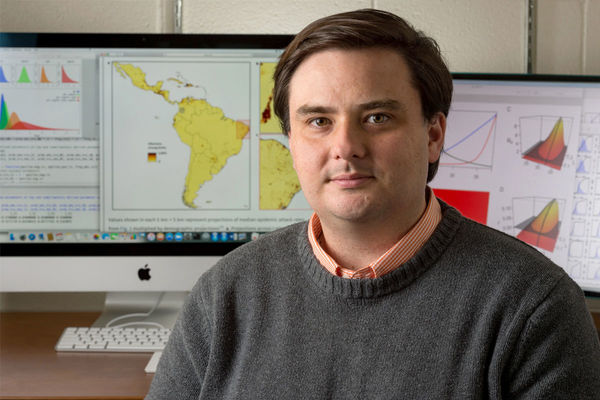For people living in the US, the Zika epidemic of 2016 seemed to have come out of nowhere and to have now almost disappeared. Zika infections and microcephaly in newborns were daily headline news. Now where are we?
Alex Perkins, PhD, Eck Family Assistant Professor in the Department of Biological Sciences, and a member of the Eck Institute for Global Health, is among the nation’s leading researchers in a unique and growing area within this complex field of disease control and prevention. The Perkins Lab at the University of Notre Dame applies mathematical modeling to the study of infectious disease transmission dynamics and control with a focus on mosquito-borne diseases including, but not limited to, Zika, dengue, and malaria.

Perkins was honored recently with publishing a “Commentary” in the Proceedings of the National Academy of Sciences (PNAS). There, he provides perspective on the surge of the Zika epidemic, the power of using computational models to “provide a glimpse into the spread of Zika,” and the importance of using these models to address the greatest challenge: where and when will it go next and what can we do about it? As Perkins describes, computational models are capable of what amounts to “being provided with a description of an elephant’s trunk and tail and successfully predicting its tusks and ears.” In other words, computational modeling helps provide insights that data alone cannot.
While there are many unknowns in projecting disease spread, researchers like Notre Dame’s Perkins are developing new tools for future prevention of deadly diseases. Interest in this area has grown in response to each new epidemic threat, from SARS to pandemic influenza to Ebola and now Zika. Perkins cautions, however, that, “Advances will come most readily when researchers have the support necessary to explore new ideas not only in response to public health emergencies but in anticipation of them.”
Research on Zika in the Perkins Lab is supported by a RAPID response grant from the National Science Foundation (DEB 1641130), a DARPA Young Faculty Award (D16AP00114), and two Zika supplemental awards from the National Institutes of Allergy and Infectious Diseases at the National Institutes of Health (1P01AI098670-01A1, R01 AI102939-01A1).
The Eck Institute for Global Health recognizes health as a fundamental human right and endeavors to promote research, training, and service to advance health standards for all people, especially people in low-and middle-income countries, who are disproportionately impacted by preventable diseases.
The University of Notre Dame is a private research and teaching university inspired by its Catholic mission. Located in South Bend, Indiana, its researchers are advancing human understanding through research, scholarship, education, and creative endeavor in order to be a repository for knowledge and a powerful means for doing good in the world.
Contact: Alex Perkins at 574-631-7179, taperkins@nd.edu
Originally published by at globalhealth.nd.edu on May 26, 2017.